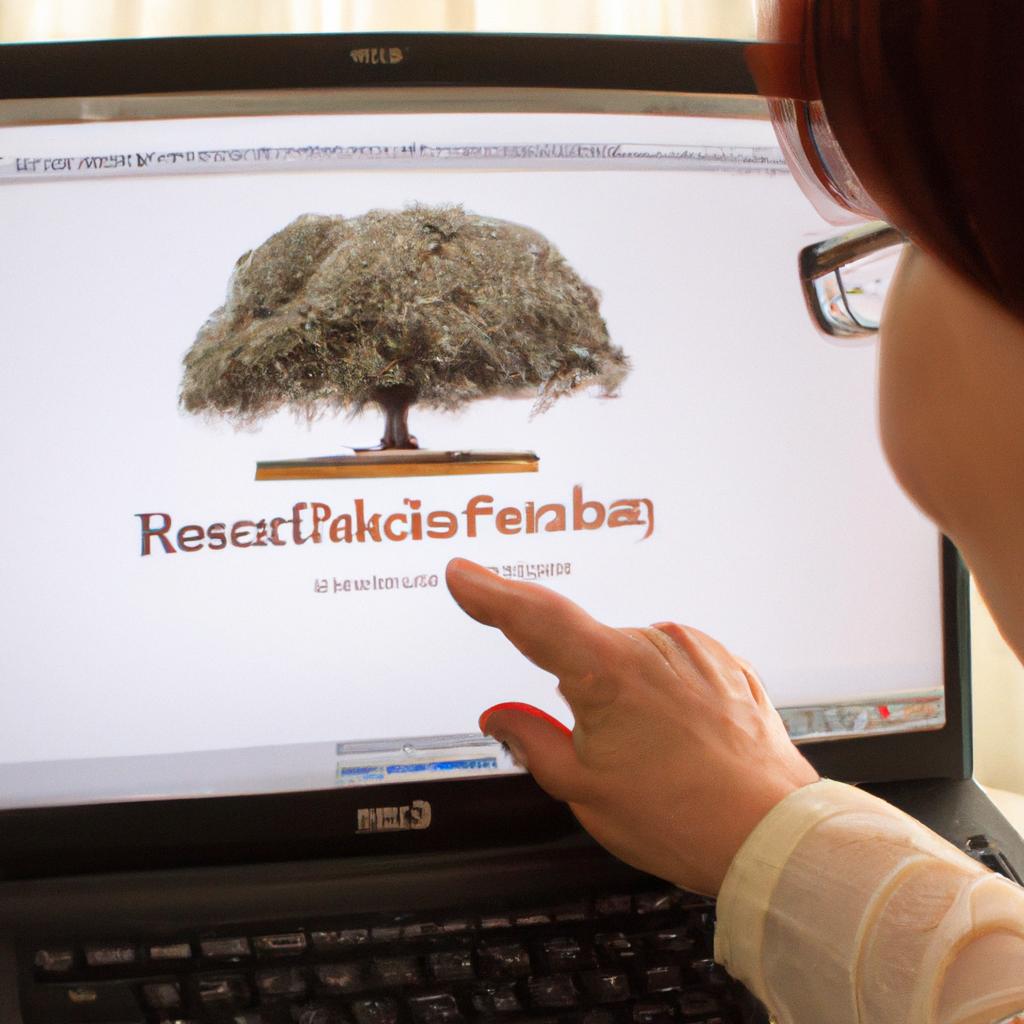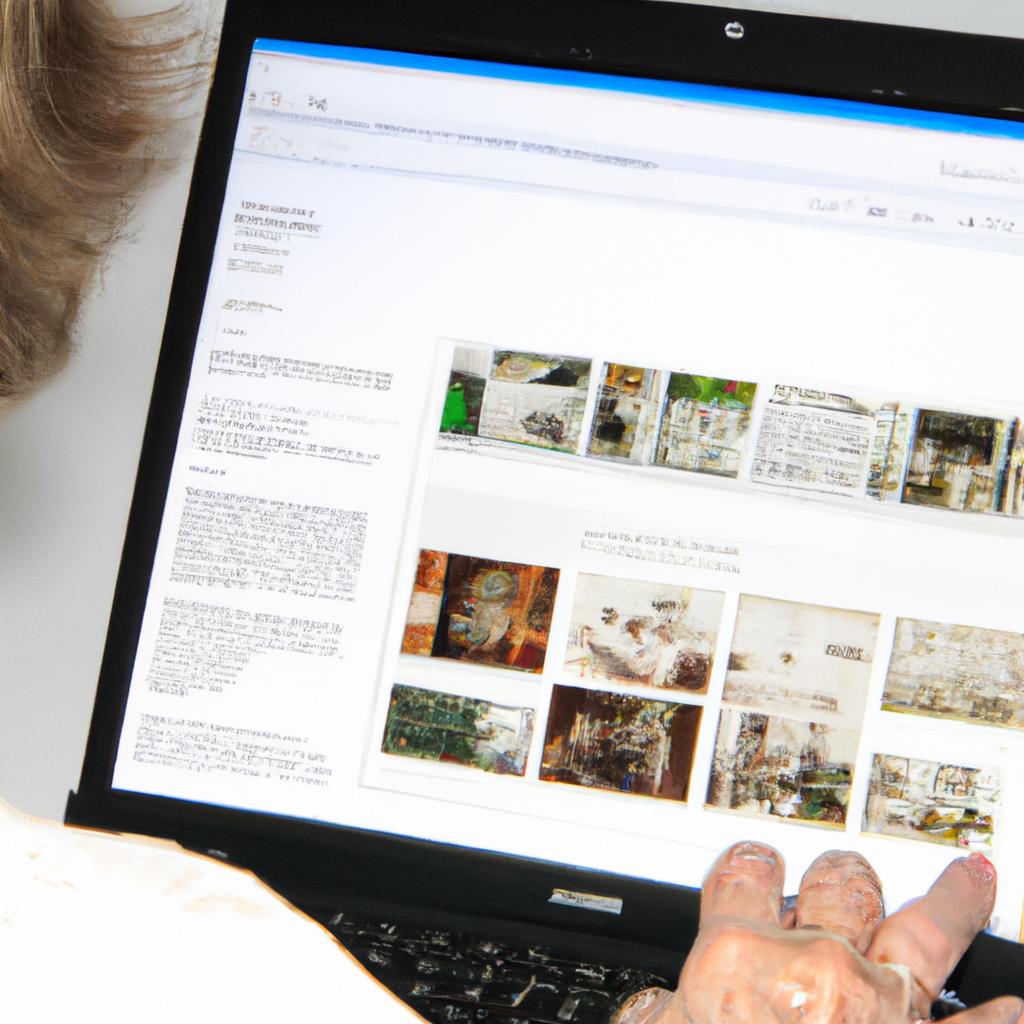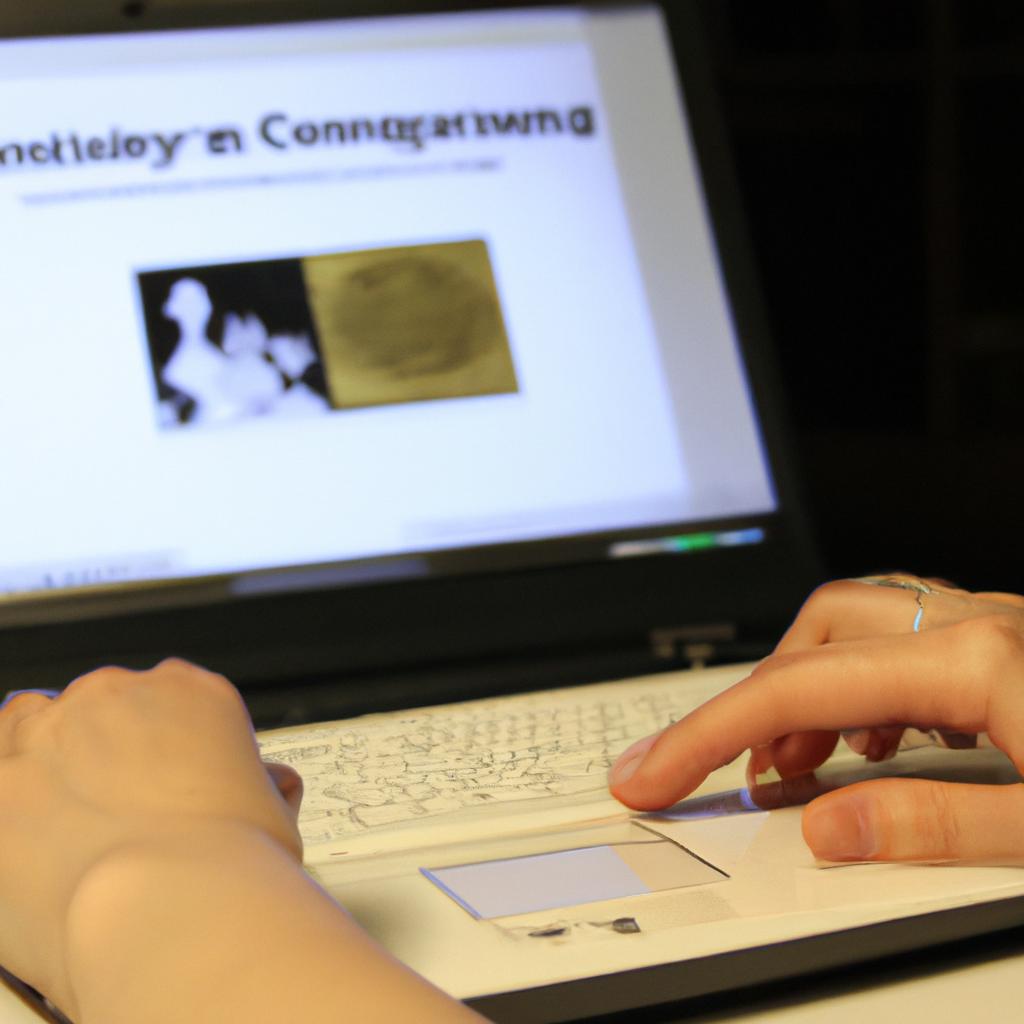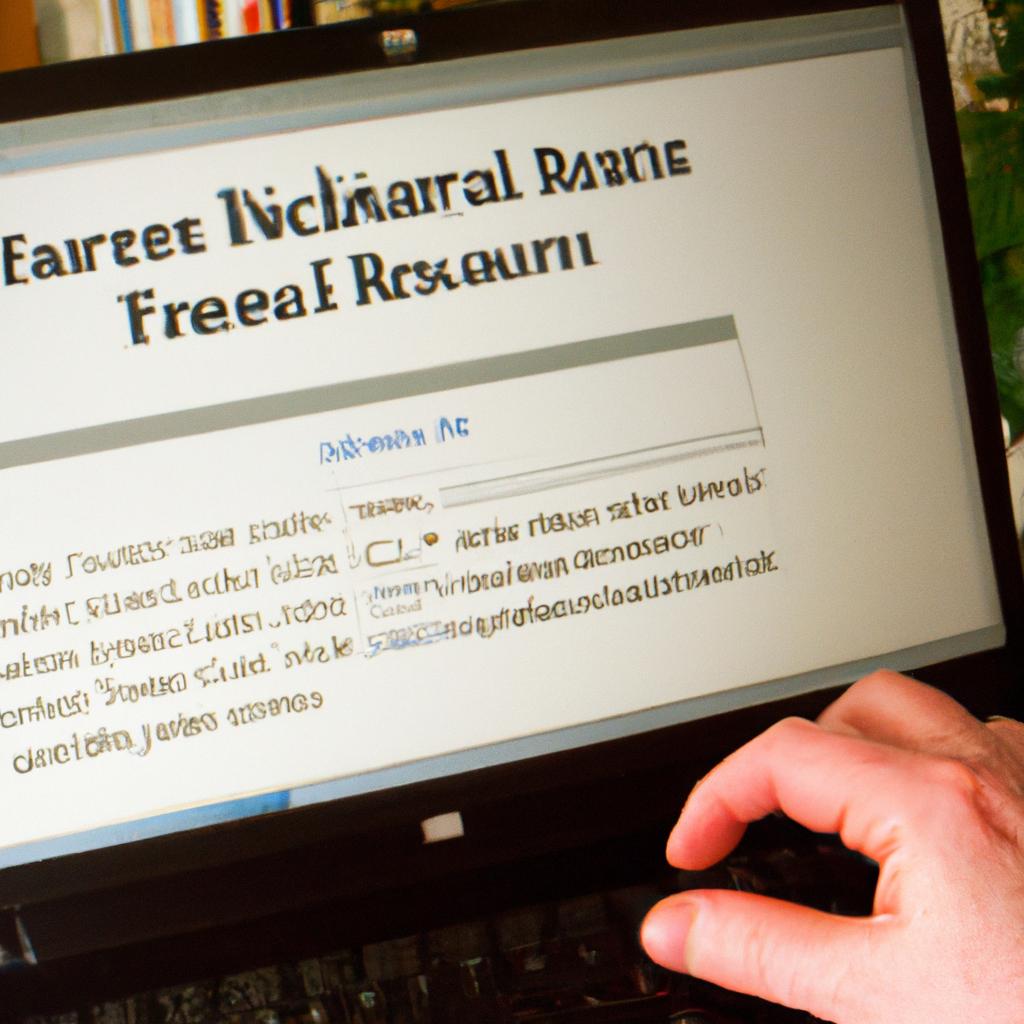Tracing one’s ancestry lineage has become increasingly popular in recent years, as individuals seek to uncover their roots and gain a deeper understanding of their family history. This pursuit of genealogical knowledge often requires specialized education and expertise in order to navigate the complex web of historical records, documentation, and DNA analysis. In this article, we will explore the importance of genealogy education for those seeking ancestry assistance, discussing how it can enhance our understanding of personal identity and provide valuable insights into cultural heritage.
To illustrate the significance of genealogy education, let us consider a hypothetical scenario: John Smith, a middle-aged man with limited knowledge about his family background, decides to embark on a journey to trace his ancestry. Armed with only fragments of information passed down through generations, such as stories from grandparents or vague recollections from childhood conversations, he realizes that unraveling the intricacies of his lineage is no easy task. Without proper training in genealogy research techniques and methodologies, John may find himself overwhelmed by the vast amount of data available – census records, birth certificates, immigration documents – each holding potential clues to unlock the mysteries of his past.
By undertaking genealogy courses or working alongside experienced professionals in the field, individuals like John can acquire vital skills necessary to effectively interpret and analyze historical records. They can learn how to utilize various research tools, such as online databases and archives, to gather information about their ancestors and construct a comprehensive family tree. Genealogy education also teaches individuals how to critically evaluate the credibility of sources and cross-reference multiple documents to ensure accuracy in their findings.
Moreover, genealogy courses often cover the fundamentals of genetic genealogy, which involves using DNA testing to uncover familial relationships and ancestral origins. Understanding the principles behind DNA analysis can help individuals like John make sense of their genetic test results and connect with long-lost relatives who share common ancestors.
In addition to technical skills, genealogy education fosters a deeper appreciation for history and culture. As individuals delve into the lives of their ancestors, they gain insights into the challenges they faced, the traditions they upheld, and the legacies they left behind. This knowledge not only enriches one’s personal understanding of identity but also contributes to a broader understanding of human history.
Furthermore, genealogy education equips individuals with ethical considerations when dealing with sensitive information about living relatives or uncovering potentially controversial aspects of family history. It emphasizes respect for privacy and encourages responsible sharing of findings within the family.
Ultimately, genealogy education empowers individuals like John to embark on their ancestry journey with confidence and competence. By acquiring specialized knowledge in research techniques, DNA analysis, historical context, and ethical considerations, they are better equipped to navigate through complex records and piece together their ancestral puzzle. The value of genealogy education lies not only in its ability to unveil personal histories but also in its capacity to foster a sense of connection with our past and provide a greater appreciation for our cultural heritage.
Understanding the Importance of Genealogy
Understanding the Importance of Genealogy
Imagine a person named Sarah who has always been curious about her family history. She wants to know where her ancestors came from, what they did for a living, and how their lives have shaped her own existence. This desire to uncover one’s ancestral roots is not uncommon; it reflects a fundamental human need to understand our place in the world and connect with those who came before us.
Genealogy, the study of family history and lineage, holds significant importance for individuals seeking to gain insight into their heritage. Through genealogical research, we can trace our ancestry back through generations, piecing together fragments of information to construct a comprehensive narrative of our familial past. By understanding where we come from, we can develop a stronger sense of identity and belonging.
The emotional significance of genealogy cannot be overstated. It allows individuals like Sarah to discover stories that might otherwise remain untold – tales of triumphs and struggles, migrations and settlements, love and loss. Delving into one’s family history can evoke feelings of nostalgia, curiosity, pride, or even sadness as long-forgotten memories resurface. To illustrate this point further:
- Family secrets: Uncovering hidden truths or long-held family secrets can bring forth a range of emotions – surprise, shock, relief, or reconciliation.
- Sense of connection: Discovering shared experiences or genetic traits across multiple generations fosters a sense of kinship between oneself and distant relatives.
- Cultural exploration: Exploring different cultural backgrounds within one’s lineage provides an opportunity for self-discovery and appreciation for diverse traditions.
- Legacy preservation: Studying genealogy ensures that future generations will have access to their rich familial heritage.
| Emotional Benefits |
|---|
| Connection with the past |
| Understanding personal identity |
As we embark on this journey into our family’s past, it is essential to recognize the value of exploring historical records and documents. By delving into these invaluable resources, we can uncover the stories that have shaped our ancestors’ lives and gain a deeper understanding of their experiences.
[Transition] Now, let us turn our attention to exploring historical records and documents to further unravel the mysteries of our ancestry.
Exploring Historical Records and Documents
Tracing Ancestry Lineage: Genealogy Education for Ancestry Assistance
Understanding the Importance of Genealogy has shed light on the significance of exploring one’s family roots and understanding their ancestral lineage. Now, let us delve deeper into the practical aspects of genealogical research by examining historical records and documents that can provide valuable insights into our ancestry.
To illustrate this point, consider a hypothetical case study involving Sarah, who is eager to trace her paternal lineage. By conducting thorough research using historical records and documents, Sarah discovers an old census record from 1900 that lists her great-grandfather as residing in a small town in Iowa. This discovery prompts her to investigate further, leading her to uncover additional records such as birth certificates, marriage licenses, and immigration papers that paint a clearer picture of her ancestors’ lives and experiences.
Exploring historical records and documents allows individuals like Sarah to gain a more comprehensive understanding of their heritage. These invaluable resources offer glimpses into past generations’ names, relationships, professions, residences, and significant life events. By piecing together these fragments of information through diligent research, people can forge connections with long-lost relatives or communities they may not have known existed.
As we embark on our own journey of tracing ancestry lineage, it is important to recognize the emotional impact this process can have on individuals. Discovering details about our ancestors evokes emotions such as pride, gratitude, curiosity, or even sadness if certain revelations challenge preconceived notions about our heritage. It can be overwhelming yet exhilarating to unravel stories hidden within the pages of history that connect us with those who came before us.
- Emotions stirred by genealogical discoveries:
- A sense of belonging
- Deepened appreciation for familial ties
- Fascination with personal narratives
- Reverence for ancestral struggles
In addition to emotional responses, tangible evidence found within historical records often provides validation and affirmation for individuals seeking to understand their roots. The following table exemplifies how various documents can contribute to a more comprehensive understanding of one’s ancestry:
| Document Type | Information Provided |
|---|---|
| Census Records | Names, ages, and locations |
| Birth Certificates | Dates and places of birth |
| Marriage Licenses | Spouses’ names and marriage dates |
| Immigration Papers | Arrival dates and countries of origin |
These records serve as tangible links to the past, allowing us to go beyond mere names on a family tree and truly appreciate the lives led by our ancestors.
By exploring historical records and documents, we unlock doors that connect us with our past. As we continue this journey of tracing our ancestry lineage, it becomes apparent that there are further tools at our disposal. Utilizing DNA testing for ancestry research provides another layer of insight into our genetic makeup and ancestral origins. Let us embark on this next step in unraveling the mysteries of our heritage through scientific means.
Utilizing DNA Testing for Ancestry Research
In the quest to trace one’s ancestry lineage, exploring historical records and documents plays a vital role. By examining these valuable resources, individuals can uncover significant information about their ancestors, gaining insights into their lives, occupations, and even personal stories. For instance, let us consider a hypothetical case study of Sarah Johnson who wants to delve into her family history. She starts by researching census records from different periods in various locations where her ancestors resided.
To effectively explore historical records and documents for genealogical research, it is essential to follow certain strategies:
- Organize your approach: Begin with creating a comprehensive plan that outlines your research goals and objectives. This will help you stay focused while navigating through numerous records.
- Leverage online databases: Utilize digital platforms dedicated to preserving and providing access to historical records such as Ancestry.com or FamilySearch.org. These websites offer extensive collections spanning various regions and time periods.
- Be thorough in your search: Cast a wide net by investigating multiple sources like birth certificates, death records, immigration papers, land deeds, military enlistment registers, newspapers archives etc., as each document may hold unique details about your ancestors’ lives.
- Cross-reference findings: Verify the accuracy of discovered information by cross-referencing it with other relevant documents whenever possible. This practice helps ensure consistency and minimizes the likelihood of errors.
By employing these strategies diligently, researchers can unlock fascinating details about their family history. To illustrate further how valuable historical record exploration can be for genealogy enthusiasts, refer to the following table showcasing some examples of data that could be uncovered during this process:
| Document | Discovered Information |
|---|---|
| Census Record | Names of household members; ages; occupation; birthplace |
| Marriage License | Date and location of marriage; names of bride & groom |
| Immigration Form | Arrival date; port of entry; country of origin |
| Military Records | Enlistment date; unit served in; battles participated in |
As researchers delve deeper into these records, they gain a richer understanding of their ancestors’ lives and the context in which they lived. In this way, exploring historical documents becomes an enlightening journey that connects individuals to their past.
Transitioning smoothly into the subsequent section about “Tracing Lineage through Birth and Marriage Certificates,” we now turn our attention to another crucial aspect of genealogical research: utilizing official documentation.
Tracing Lineage through Birth and Marriage Certificates
Tracing Ancestry Lineage: Genealogy Education for Ancestry Assistance
Utilizing DNA Testing for Ancestry Research has proven to be an invaluable tool in genealogical research. However, it is important to note that DNA testing alone cannot provide a complete picture of one’s ancestry. Tracing lineage through birth and marriage certificates is another crucial aspect of the genealogical journey.
Imagine a scenario where an individual has taken a DNA test and discovered they have Native American ancestry. This newfound knowledge prompts them to delve deeper into their family history to learn more about this heritage. While DNA testing can confirm the presence of Native American genetic markers, it may not reveal specific ancestors or tribal affiliations. To uncover these details, tracing lineage through birth and marriage certificates becomes essential.
When exploring birth and marriage certificates as part of genealogical research, several key factors come into play:
- Availability: Birth and marriage records vary in accessibility depending on location and time period. Some regions may have comprehensive record-keeping systems dating back centuries, while others may have limited documentation due to natural disasters or political events.
- Accuracy: It is crucial to ensure the accuracy of information found within birth and marriage certificates. Mistakes such as misspelled names or incorrect dates could lead researchers down the wrong path if not properly verified.
- Supplemental Information: Birth and marriage certificates often contain additional valuable information beyond just names and dates. Details like parents’ names, addresses, occupations, and witnesses can provide further clues for building a comprehensive family tree.
- Collaboration with Other Records: Birth and marriage certificates should be cross-referenced with other documents such as census records, immigration records, wills, land deeds, and church registers to obtain a more holistic understanding of one’s ancestral lineage.
Incorporating emotional elements into our discussion can help connect readers on a personal level:
- The joy experienced when uncovering long-lost birth certificates, shedding light on a previously unknown branch of the family tree.
- The frustration and disappointment when encountering missing or incomplete marriage records, leaving gaps in one’s ancestry story.
- The sense of fulfillment derived from collaborating with other genealogists and sharing knowledge to piece together the puzzle of one’s lineage.
To further illustrate the importance of birth and marriage certificates in genealogy research, consider this table:
| Birth Certificate | Marriage Certificate |
|---|---|
| Name | Names of Spouses |
| Date and Place | Date and Place |
| Parents’ Names | Witnesses |
| Address | Officiating Person |
By examining these documents side by side, researchers can make connections, identify patterns, and deepen their understanding of familial relationships.
In conclusion, while DNA testing provides valuable insights into ancestral origins, tracing lineage through birth and marriage certificates allows individuals to delve deeper into their family history. By considering factors such as availability, accuracy, supplemental information contained within these vital records, and collaboration with other sources, researchers can construct a more comprehensive picture of their ancestry. In our next section about “Exploring Online Genealogy Resources,” we will discuss how digital platforms have revolutionized genealogical research methods.
Exploring Online Genealogy Resources
In the pursuit of tracing one’s ancestry, birth and marriage certificates serve as crucial documents that provide valuable information about our ancestors. These records can help us uncover important details such as names, dates, and locations that are essential for building an accurate family tree. By carefully examining these certificates, we can gain insights into our lineage and expand our understanding of our familial connections.
For instance, let’s consider a hypothetical case study involving Sarah Johnson, who is researching her family history. Through thorough investigation of her ancestors’ birth and marriage certificates, she discovers that her great-grandfather was born in a small town in Ireland in 1850. This revelation prompts Sarah to explore further by obtaining additional records from Irish archives and connecting with local historians specializing in genealogical research. As a result, she uncovers fascinating stories about her ancestor’s journey to America and gains a deeper appreciation for her Irish heritage.
In today’s digital age, online genealogy resources have revolutionized the way we conduct ancestral research. With just a few clicks, individuals can access vast databases containing millions of historical records from around the world. These resources not only speed up the search process but also offer various tools and features to aid in organizing and visualizing ancestral data effectively.
To make the most out of online genealogy resources, here are some key tips to keep in mind:
- Utilize multiple platforms: Different websites specialize in different types of records or geographic areas. Exploring multiple platforms increases your chances of finding relevant information.
- Collaborate with others: Joining online forums or communities dedicated to genealogy allows you to connect with fellow researchers who may have helpful insights or be working on similar lineages.
- Keep track of sources: It is essential to record all sources used during your research journey. Maintaining comprehensive citations ensures transparency and facilitates future reference.
- Be patient and persistent: Tracing lineage often requires time, dedication, and perseverance. Don’t get discouraged if you hit roadblocks along the way; keep pushing forward.
By employing these strategies and leveraging the power of online genealogy resources, individuals can delve deeper into their family history and uncover hidden stories that connect generations.
In addition to birth and marriage certificates and online resources, connecting with distant relatives is another valuable avenue for expanding our understanding of ancestry. Reaching out to extended family members who may have already conducted research or possess unique family documents can offer new leads and foster a sense of belonging within a broader familial community.
Transitioning into Connecting with Distant Relatives section:
As we continue on our journey to unravel our ancestral roots, delving further into connections within our extended families becomes instrumental. By reaching out to distant relatives, we open doors to shared knowledge, personal anecdotes, and potentially unexplored branches in our family trees.
Connecting with Distant Relatives
Tracing Ancestry Lineage: Genealogy Education for Ancestry Assistance
Transitioning from the previous section on exploring online genealogy resources, let us now delve into another important aspect of tracing ancestry lineage – genealogy education. Having a solid understanding of genealogical research techniques and resources can greatly enhance our ability to uncover and connect with our ancestors.
To illustrate this point, consider the following example: John Smith is eager to learn more about his family history but feels overwhelmed by the vast amount of information available online. He begins by seeking out educational materials specific to genealogy research techniques. By familiarizing himself with different record types such as census data, birth records, and immigration documents, he gains valuable insights into where he might find relevant information about his ancestors.
In order to efficiently navigate the world of genealogy, it is crucial to equip oneself with proper knowledge and skills. Here are some key reasons why investing in genealogy education can be invaluable:
- Enhanced Research Techniques: Learning advanced research methods allows individuals to conduct thorough investigations and maximize their chances of discovering accurate ancestral information.
- Access to Specialized Databases: Many educational programs provide access to exclusive databases that may not be readily available through general online searches.
- Networking Opportunities: Participating in genealogy courses or workshops creates opportunities to connect with fellow researchers who share similar interests, providing a supportive community for exchanging ideas and tips.
- Preservation of Family History: Investing in genealogical education helps preserve family stories for future generations while ensuring accuracy in documenting ancestral lineages.
Furthermore, below is a table highlighting various sources of formal genealogical education:
| Institution | Program Offered | Location |
|---|---|---|
| National Genealogical Society (NGS) | American Genealogical Studies Certificate Program | United States |
| Institute of Heraldic and Genealogical Studies (IHGS) | Higher Certificate in Genealogy | United Kingdom |
| Brigham Young University-Idaho | Online Family History Research Courses | United States |
| Board for Certification of Genealogists (BCG) | Certification Program | International |
By actively seeking genealogy education, individuals like John Smith can gain a deeper understanding of the intricate techniques involved in tracing ancestral lineages. Armed with this knowledge, they are better equipped to utilize online resources effectively and make meaningful connections with distant relatives.
In summary, exploring online genealogy resources is just one piece of the puzzle when it comes to tracing ancestry lineage. Investing in genealogy education not only enhances research techniques but also provides access to specialized databases, networking opportunities, and ensures accurate preservation of family history. By acquiring the necessary skills through formal programs or courses offered by reputable institutions such as NGS, IHGS, BYU-Idaho, and BCG, individuals can embark on their journey towards uncovering their rich ancestral heritage.





